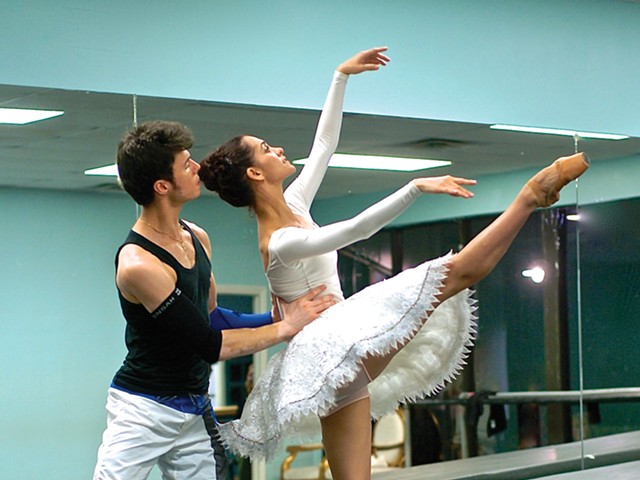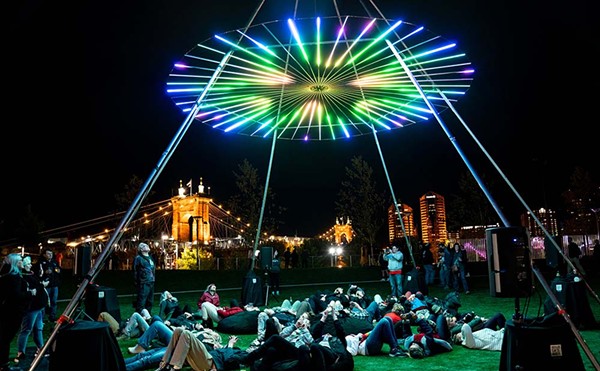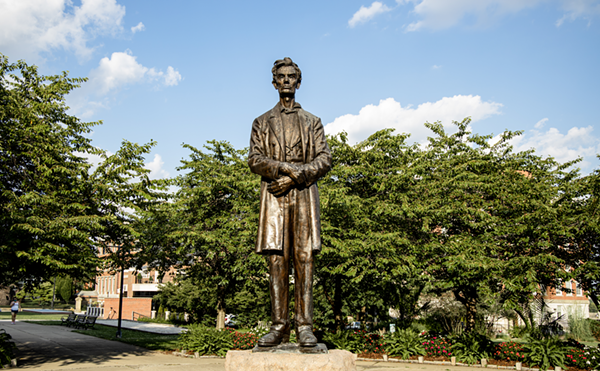H
ow was 2013 as a year for plays and musicals in Cincinnati? From where I stand — or sit, since I’m most often in a seat at one of our local theaters — it stacked up pretty well. We’re still lacking a coherent theater awards program, although the League of Cincinnati Theatres still evaluates shows around town. And without a program, there’s not much breathless anticipation to see which performances or actors will earn the Cincinnati equivalent of Broadway’s Tony Award. Nevertheless, the 2013 theater scene offered plenty to brag about and many varied opportunities for people with diverse tastes.
Let’s start with the Cincinnati Playhouse in the Park, which actually has won two Tony Awards, certifying it as one of America’s outstanding regional theaters. The Playhouse, led by artistic director Blake Robison, who is now in the midst of his second season, has two stages and 11 opportunities annually to present productions that must satisfy a broad range of theatergoers. It’s no small task, and taking risks on unfamiliar titles is not what very many artistic directors would do.
But Robison has proved to be pretty fearless in the plays he presents. Early in 2013, he staged Roberto Aguirre-Sacasa’s Abigail/1702, a kind of sequel to Arthur Miller’s Pulitzer Prize winner, The Crucible, envisioning the life of troublemaker Abigail Williams a decade after the Salem Witch Trials. The show was the 66th new work produced by the Playhouse, now in its sixth decade, and Robison is admirably sustaining that tradition. Before Abigail/1702 closed, he opened another brand-new work, Leveling Up, a very in-the-moment piece about video gamers and the fantasy worlds they inhabit, ultimately as harrowing as anything reality might throw at them. (While Leveling Up was onstage, national news accounts reported that the military were indeed recruiting gamers to fly drones into war zones — just what playwright Deborah Zoe Laufer had anticipated.)
In September, Robison opened his second season with Fly, the story of four Tuskegee Airmen who overcame racial prejudice during World War II to fly heroic missions over Europe. Trey Ellis and Ricardo Khan’s inventive script used a character they dubbed “Tap Griot,” a storytelling tap dancer who contained and conveyed the varied feelings that the young men were often not free to express. This well-received work from 2009 was new but not brand-new. It was, however, followed in October by the world premiere of Martín Zimmerman’s Seven Spots on the Sun, the story of a war-torn Central American nation where civil strife had torn apart a population and dehumanized caring people. In case you’re counting, that marked the Playhouse’s 68th world premiere.
Ensemble Theatre bills itself as “your premiere theatre,” and producing artistic director D. Lynn Meyers does a noteworthy job of landing presenting plays that were the talk of New York a few months earlier. Mark St. Germain’s Freud’s Last Session was one of these, a sparring match between two great minds of the early 20th century — the great psychiatrist Sigmund Freud and the theologian and author C.S. Lewis. Featuring Barry Mulholland and Bruce Cromer and directed by the Playhouse’s Michael Evan Haney, it was a memorable exploration of distinctly different life philosophies.
Meyers has kept things rolling with her 2013-2014 season, beginning with Jon Robin Baitz’s exploration of generational misunderstandings within one contentious family in Other Desert Cities, and continuing with Gina Gionfriddo’s “dramedy” Rapture, Blister, Burn, insightfully examining perspectives on feminism and the roles of men and women in today’s world. Both productions featured admirable casts of local professional actors.
The 10th Cincinnati Fringe Festival, presented by Know Theatre, took place in June, an annual burst of creativity and serious foolishness that draws thousands of people to Over-the-Rhine for short, often startling performances. I especially liked two shows: Lolita, which was enacted by three men from Minnesota who offered funny twists on and faithful reproduction of Vladimir Nabokov’s scandalous novel. And Petunia & Chicken, a script inspired by the writings of American novelist Willa Cather, which captured a lifelong love story of a couple in a simpler time on the American prairie; two actors recreated an entire community of farming, tragedy and joy.
Know Theatre produced a show I will remember for many years, Australian playwright Andrew Bovell’s When the Rain Stops Falling. It’s a remarkable piece of theater about intertwining families and generations, told lyrically and mysteriously. Its story circles out, winds around on itself, and then tragically clicks everything into place. A cast of accomplished actors made this an especially memorable production; Cincinnati Shakespeare Company’s artistic director Brian Isaac Phillips used many actors usually seen on CSC’s stage.
Phillips’ Shakespeare company takes a broad approach to the classics for productions at its Race Street venue, leavening plays by William Shakespeare with classics from other eras, including writers such as Jane Austen and Charles Dickens. This fall, company members Jeremy Dubin and Jim Hopkins played anxious Lennie and man-child George in Drew Fracher’s moving production of John Steinbeck’s Of Mice and Men. CSC extended its influence on local acting talent — the company routinely offers acting classes for young people — by working in November with theater majors at Xavier University to stage a much praised campus production of The Crucible.
There were fine musicals during 2013, too, especially a pair at The Carnegie in Covington, Ky., which regularly partners with other arts organizations to produce shows. In April, it presented Parade, Jason Robert Brown’s tragic tale of anti-Semitism in Atlanta a century ago, featuring musical theater performers from the University of Cincinnati’s College-Conservatory of Music. It was staged by the husband-and-wife team of Ed Cohen and Dee Anne Bryll, who returned to The Carnegie in August to produce Kander and Ebb’s vaudeville-inspired Chicago. It’s not an easy show, but they assembled the talent and made it work. At CCM’s own Corbett Auditorium in November, the movie musical Singin’ in the Rain was brought to life with big dance numbers, an oversized orchestra — and real rain.
There was an abundance of fine theater in 2013, and the coming year promises more of the same. ©






